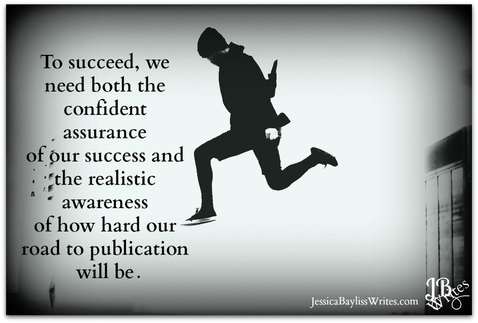

“You can do it. You can write!”
| Jessica Bayliss |
|
 Once again, I'm excited that "Judging More than Just the Cover," is hosting this month's "It's a Writer Thing" post. Amber Gregg's blog is a rich and informative resource for writers, plus a lot of fun! Okay, first off, I swear I watch more than reality TV. It’s just the fiction shows don’t get my mind whirring about success in writing the way the reality options do, and a new show we just started watching reminds me a lot of a concept from motivational psychology. Of course, I immediately applied the whole thing to writing. So, the show. My new favorite is called “From Fit to Fat to Fit.” I’m drawn to this one for the same reason I love the others: I’m always interested in watching someone accomplish something incredible by pushing themselves beyond their limits. In fashion design, it’s pushing their creativity. In dance, it’s creativity and limits of physicality. And in the new show, it’s stamina, fitness, and will. Plus, exercise is one of my personal foundations, so watching someone completely change their health via nutrition and exercise is immensely empowering for me. Writers have a similarly grueling path to walk to get from those first words to publication. As I’ve discussed in past “It’s a Writer Thing Posts,” it takes an immense amount of work and an immense amount of staying power. (Remember the story of the dancer from “So You Think You Can Dance” who was cut only to return to audition again that same season then went on to win?) That’s what writers do every day. We get rejections, and then we send out another query. We’re told our story has problems, so we sit back down and keep polishing our manuscripts. If we don’t, then our titles will never appear on the bookshelves. Okay, but what does this all have to do with some fitness show? Here goes. First off, in “From Fit to Fat to Fit,” there’s a bit of a twist on the fitness transformation trope. There’s a client—someone who’s struggled with their health for a long time—and a trainer—the expert who’s going to to get them to their goals. But the twist is that the trainers lose weight with the client. They actually gain 40 or 50 or 60 pounds in a four-month period, so they can understand what it feels like to start the journey from a place of poor health and fitness (as opposed to someone who’s always been in incredible shape and feels great every single day). Then, they suffer through the workouts with their client. The clients’ responses are always the same: “Why would you do that to yourself?” But, when it’s time for them to start, they know they’re suffering with someone who understands, and the trainers really do understand, maybe for the very first time in their lives.  This makes me think of a motivation term called “The Stockdale Paradox,” which is named after an American Military Officer who was shot down and imprisoned for five years during the Vietnam War. He was determined to survive, never doubted it, but he also brought a realistic appraisal of what that would entail. He knew it would be hell and he anticipated the length of imprisonment with remarkable accuracy. After his release, he shared how the blind optimists who shared his prison perished; they were left hopeless and helpless when their unrealistic expectations of freedom didn’t materialize. So, to bring it back to writing. To succeed, we need both the confident assurance of our success and the realistic awareness of how hard our road to publication will be. If we underestimate the challenges of publication—how much time it really takes to get that MS in shape, or how much more we must grow before we’ll be ready, or how many times we’ll have to hear, “I’m going to pass, but remember the publishing world is highly subjective …”--then we’ll just give up. If we think it will be easier than it’s supposed to be (or, that it’s easier for everyone else out there than it is for us), we’ll assume something is wrong with us or our ideas or the publishing world, and we’ll quit. That’s why the FFTFTF concept is so brilliant. For the first time, the trainer isn’t some blind optimist. The trainer experiences the challenges of exercising with fifty extra pounds. With the added insight, they validate the clients’ suffering while still championing them toward their goals (instead of making the client feel like, what the heck is wrong with you that you can’t do another sprint right now?). As writers, if we have unfailing faith in our chances for success and a realistic appraisal of what we’ll endure to get there, how on earth can we fail?
“You can do it. You can write!”
0 Comments
Leave a Reply. |
Jessica Bayliss Blogs about reading, writing, & other fun stuff
Categories
All
Archives
October 2019
|